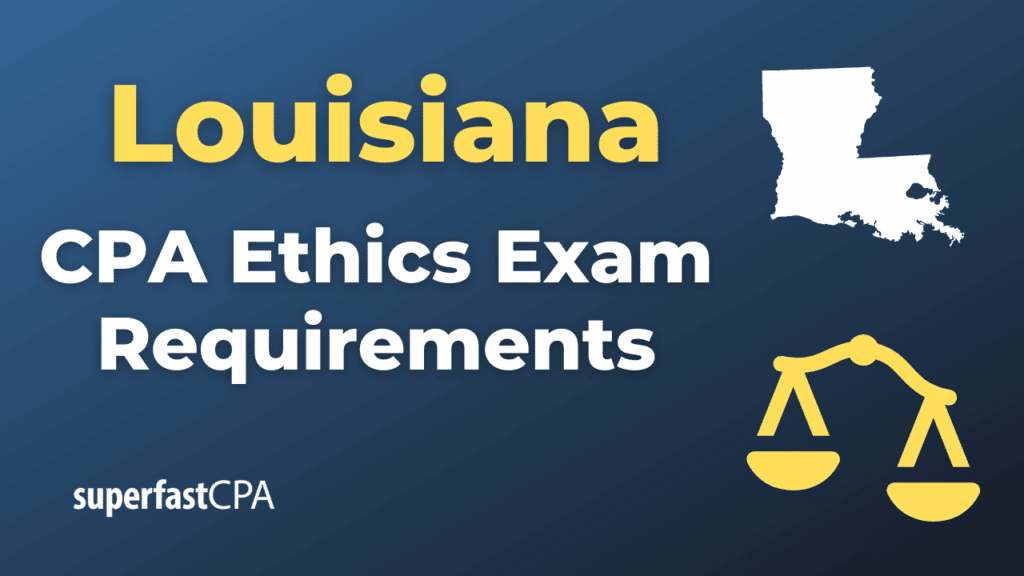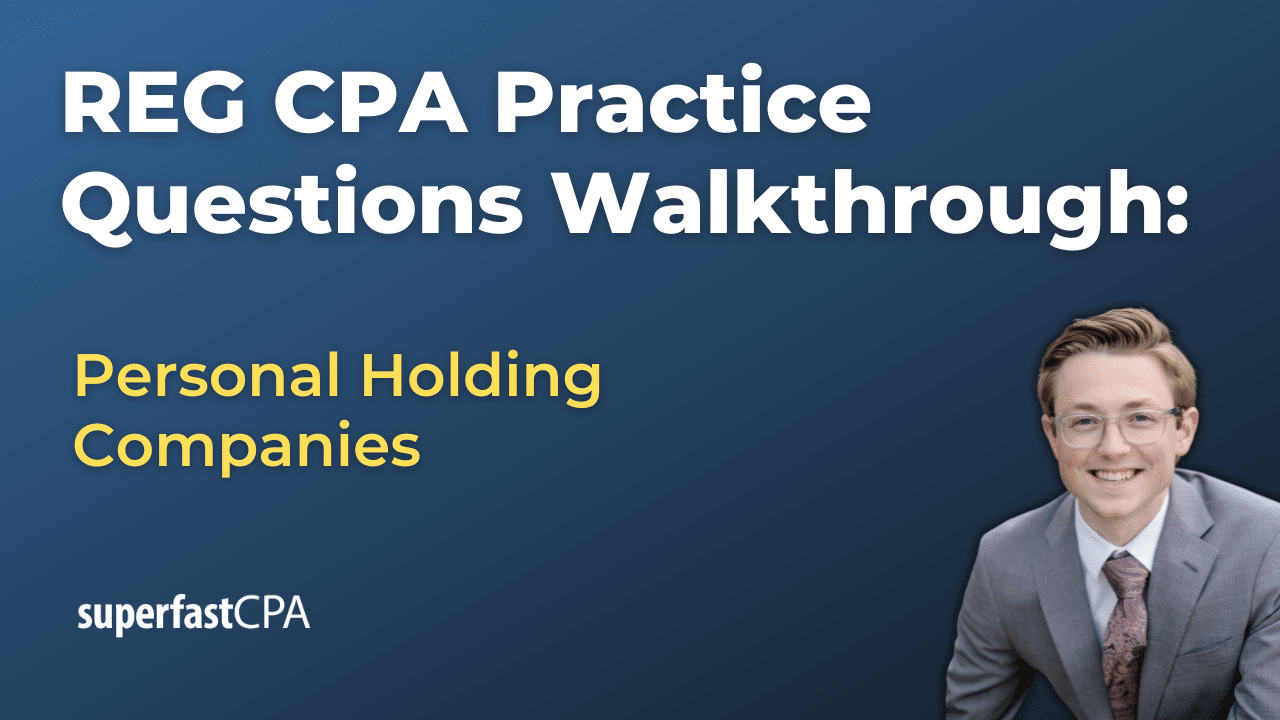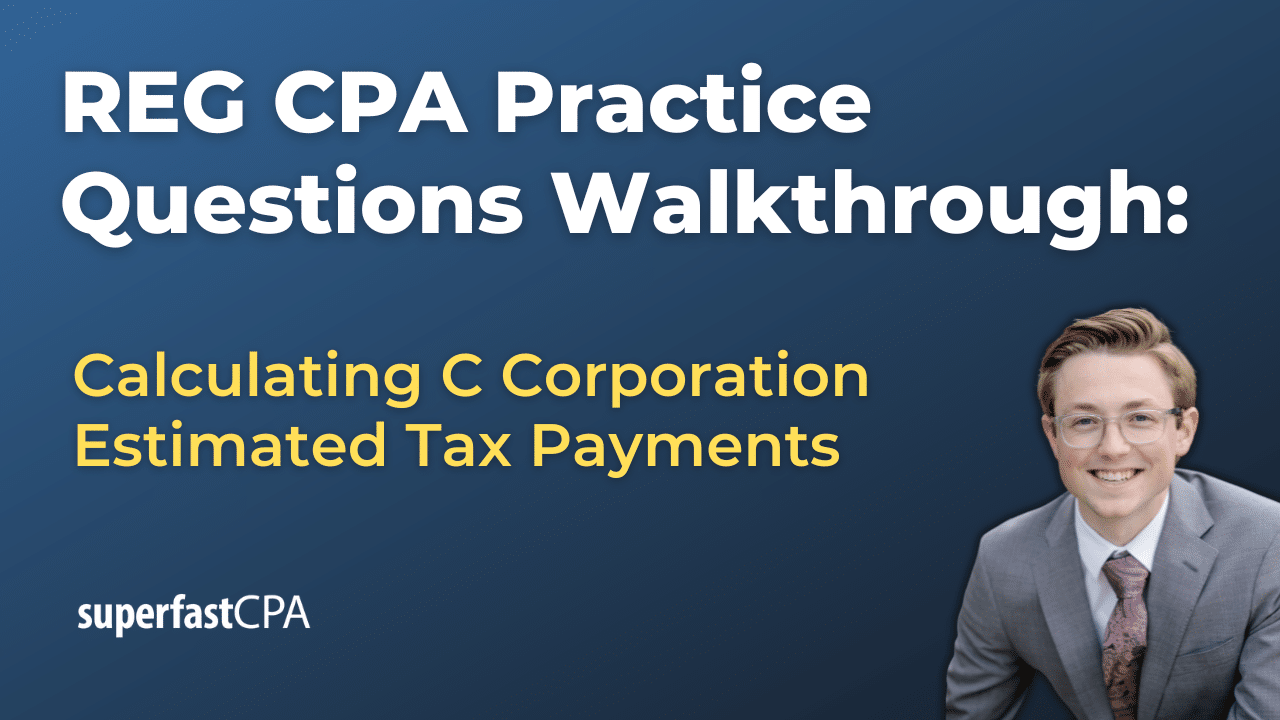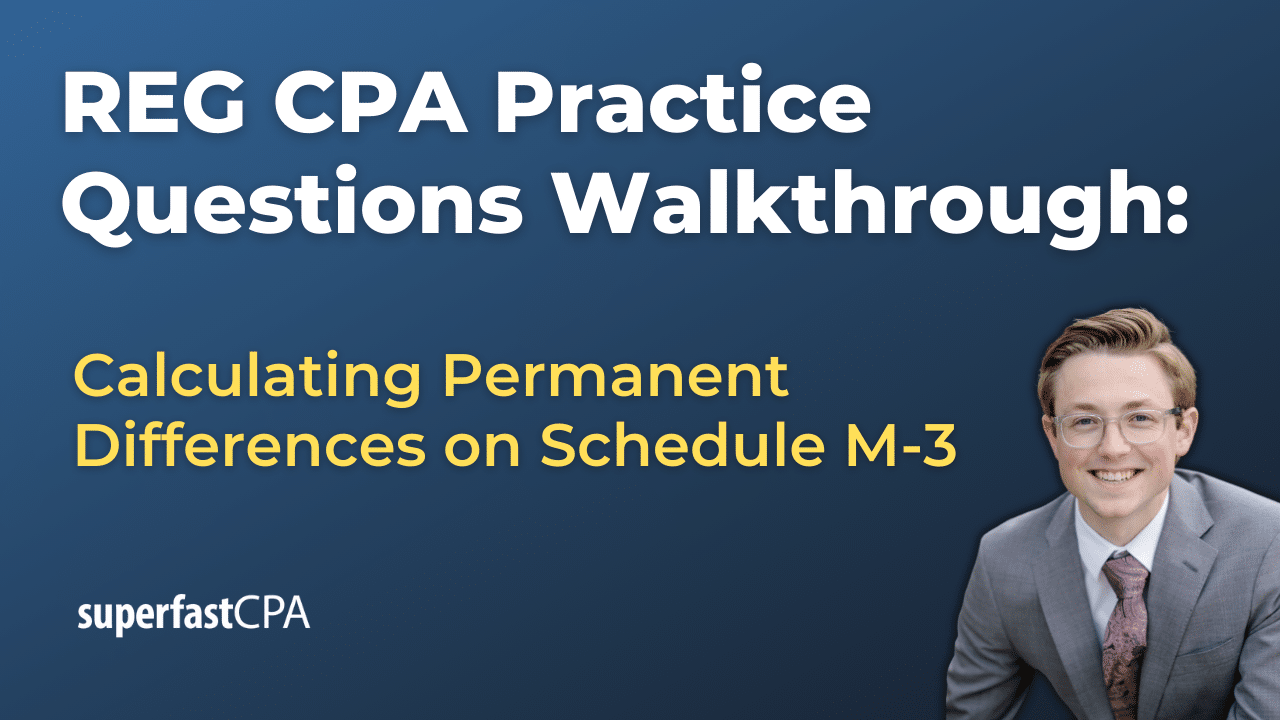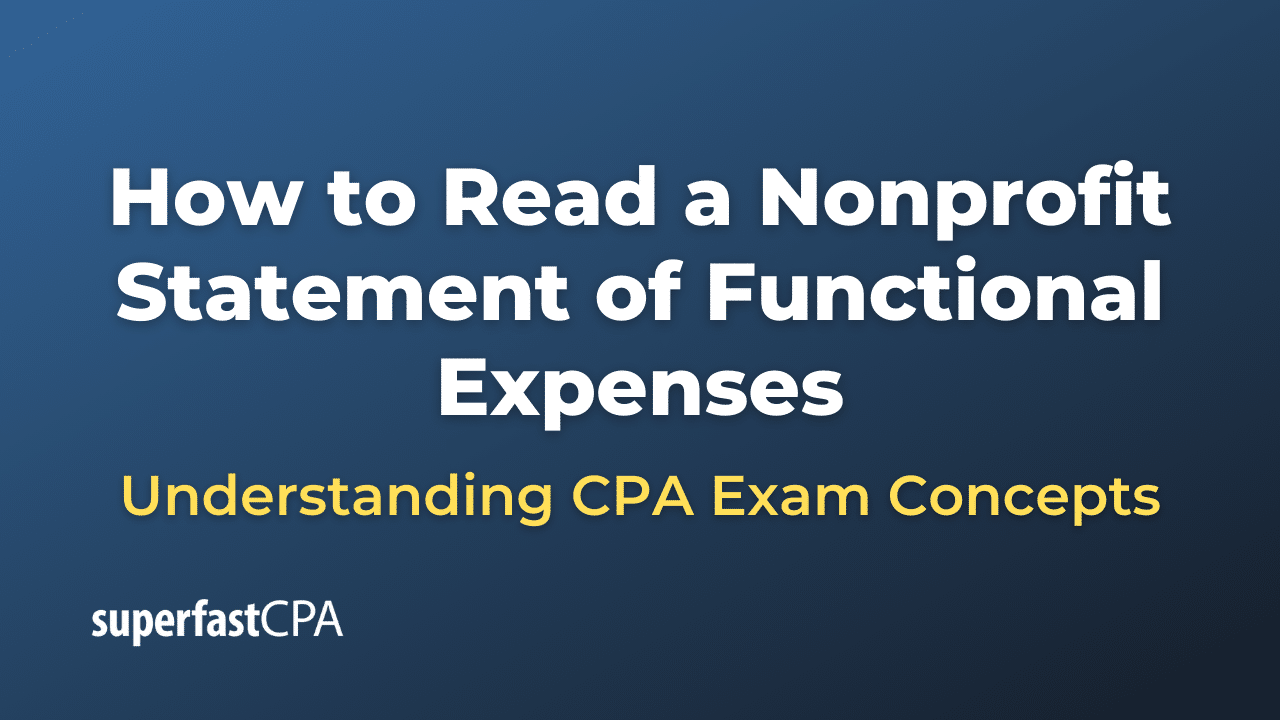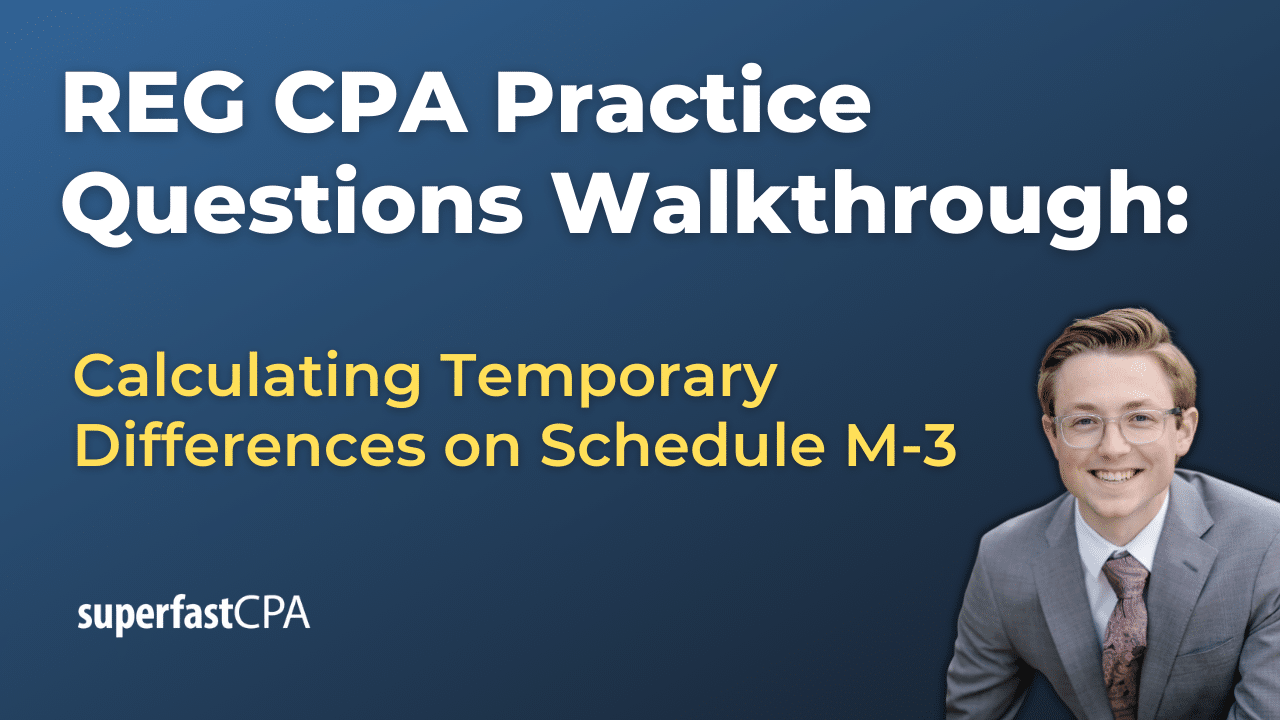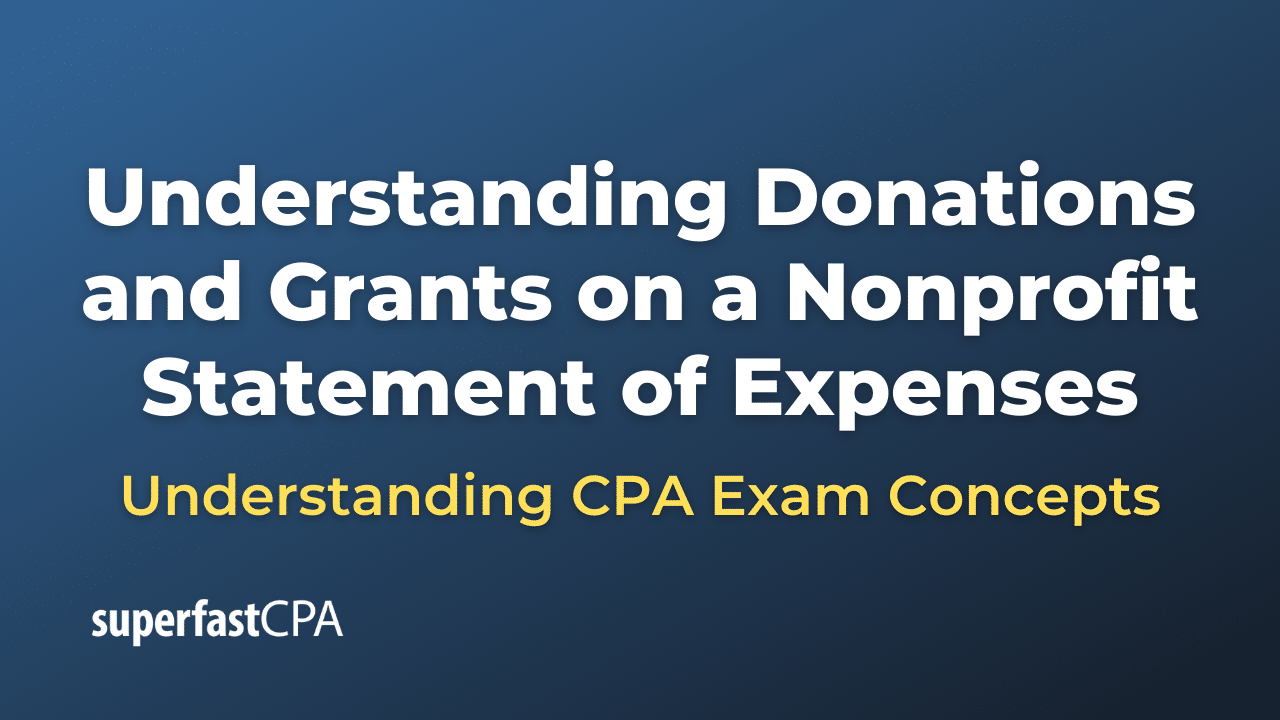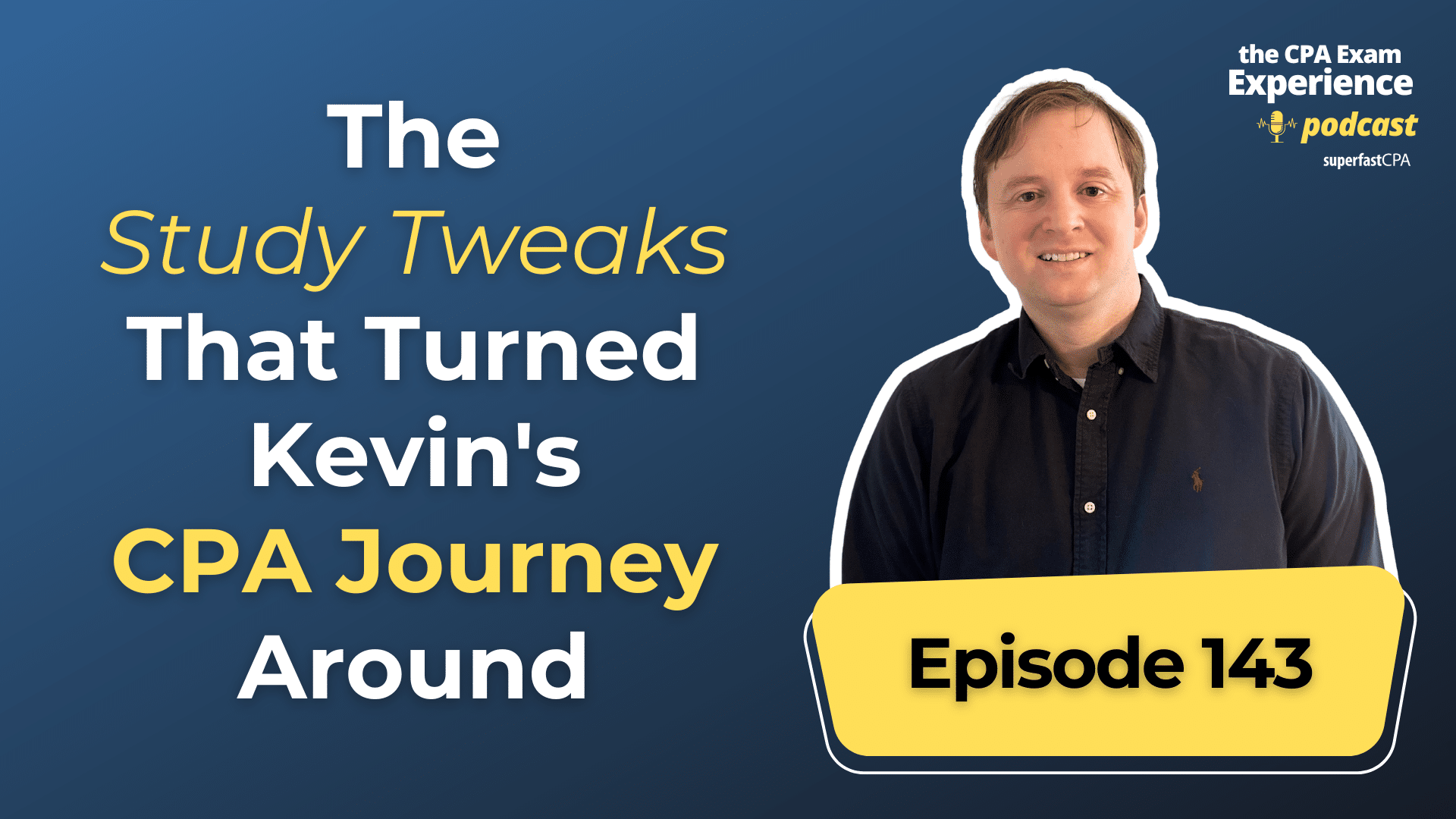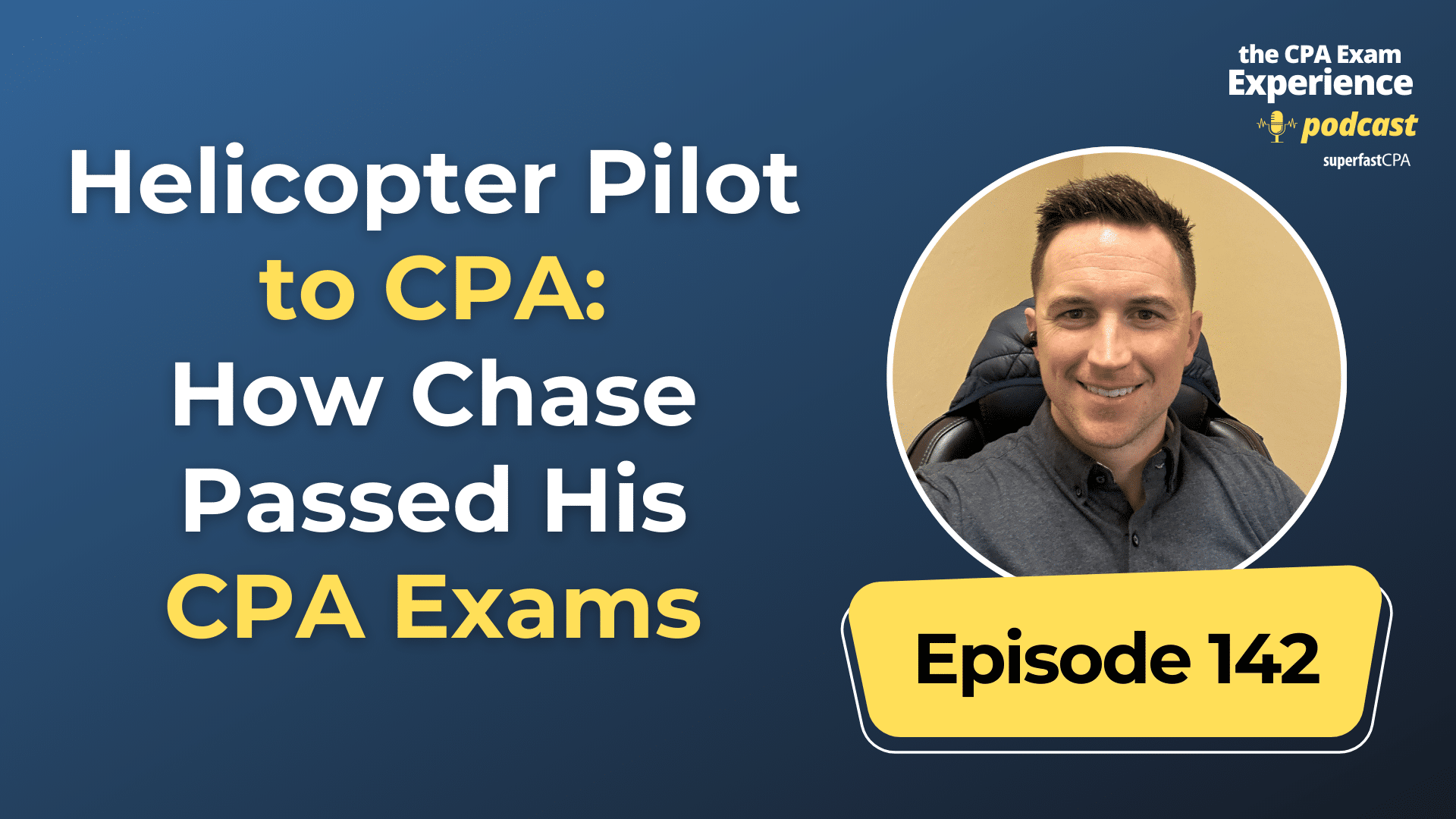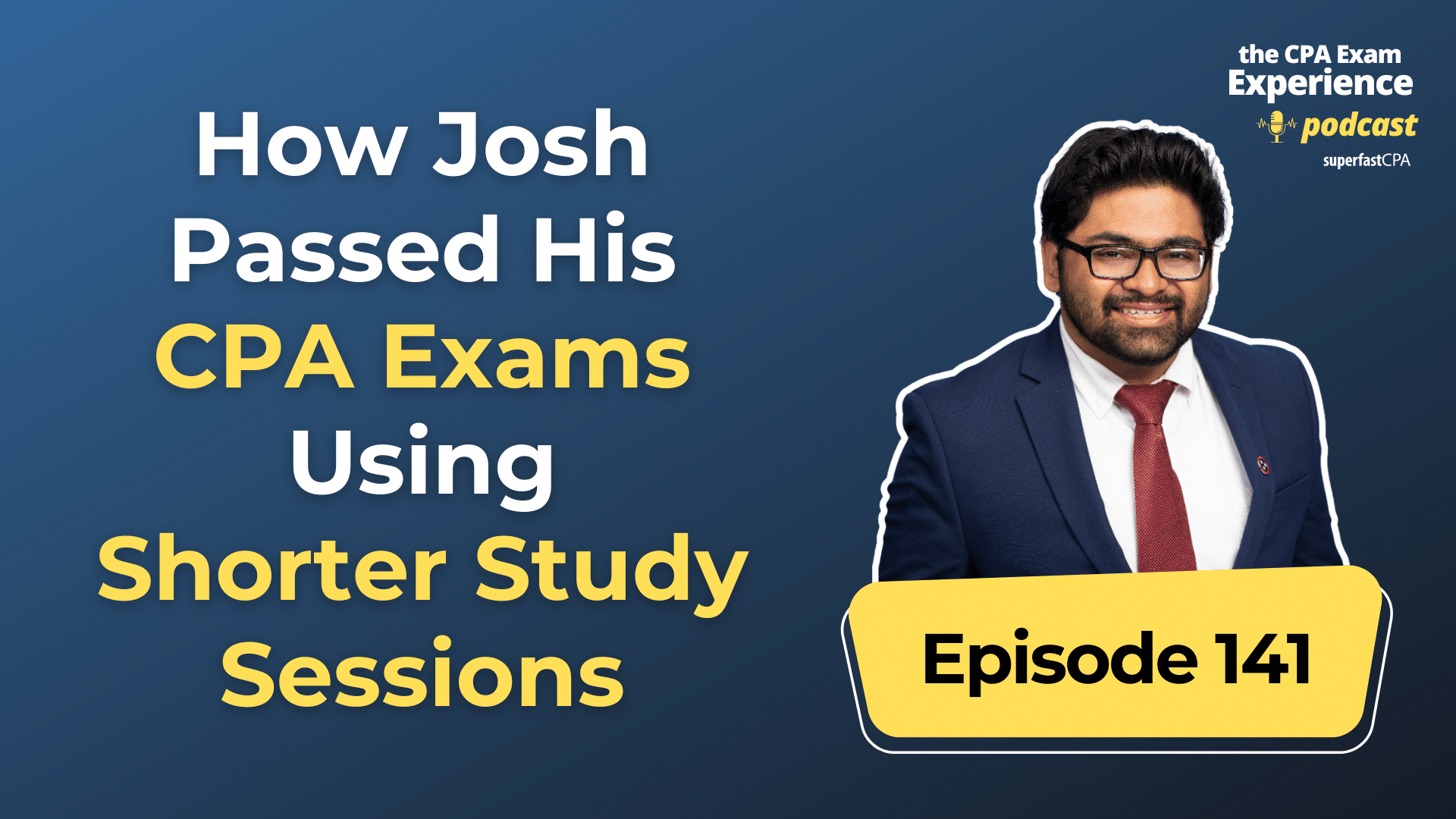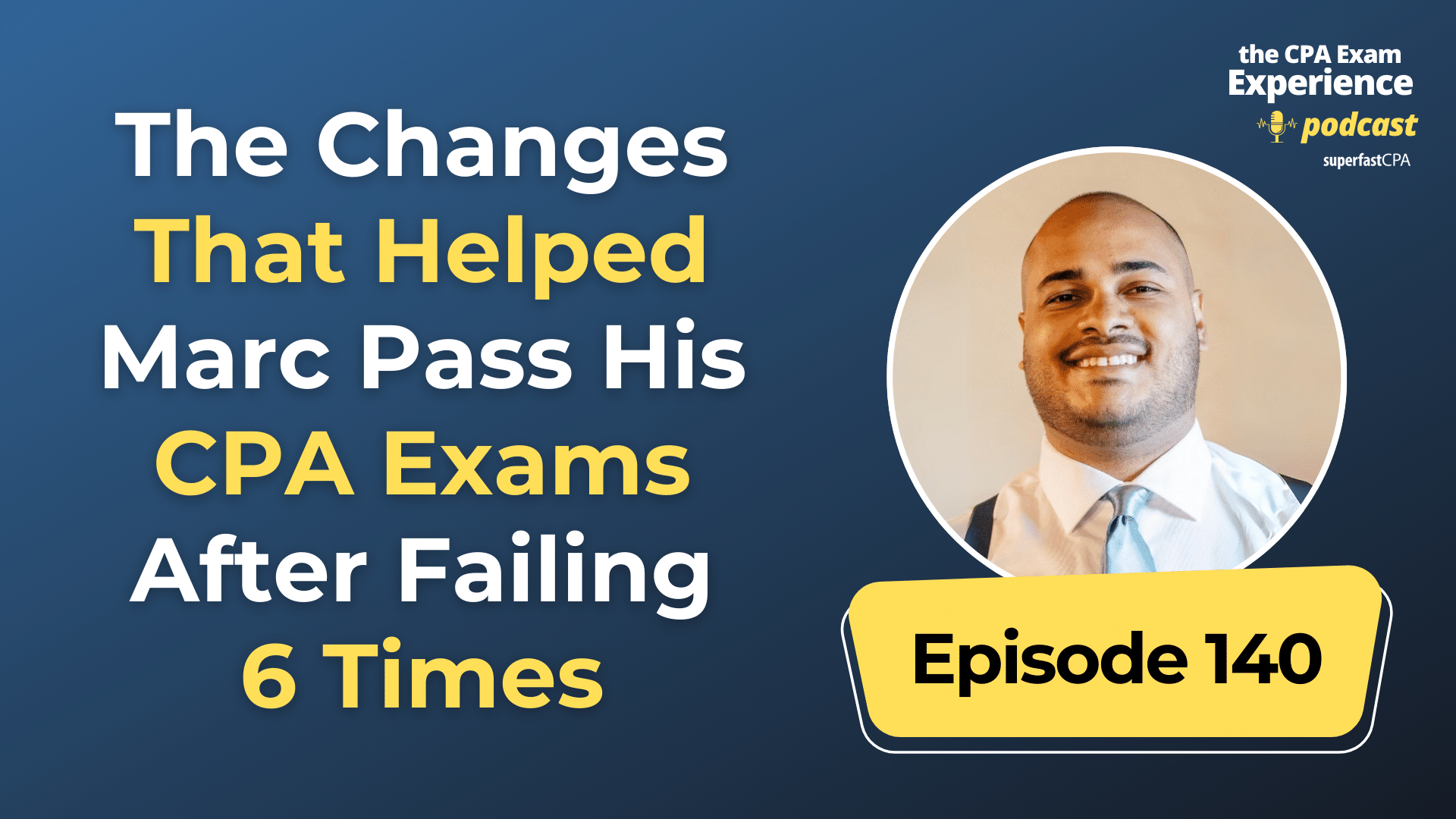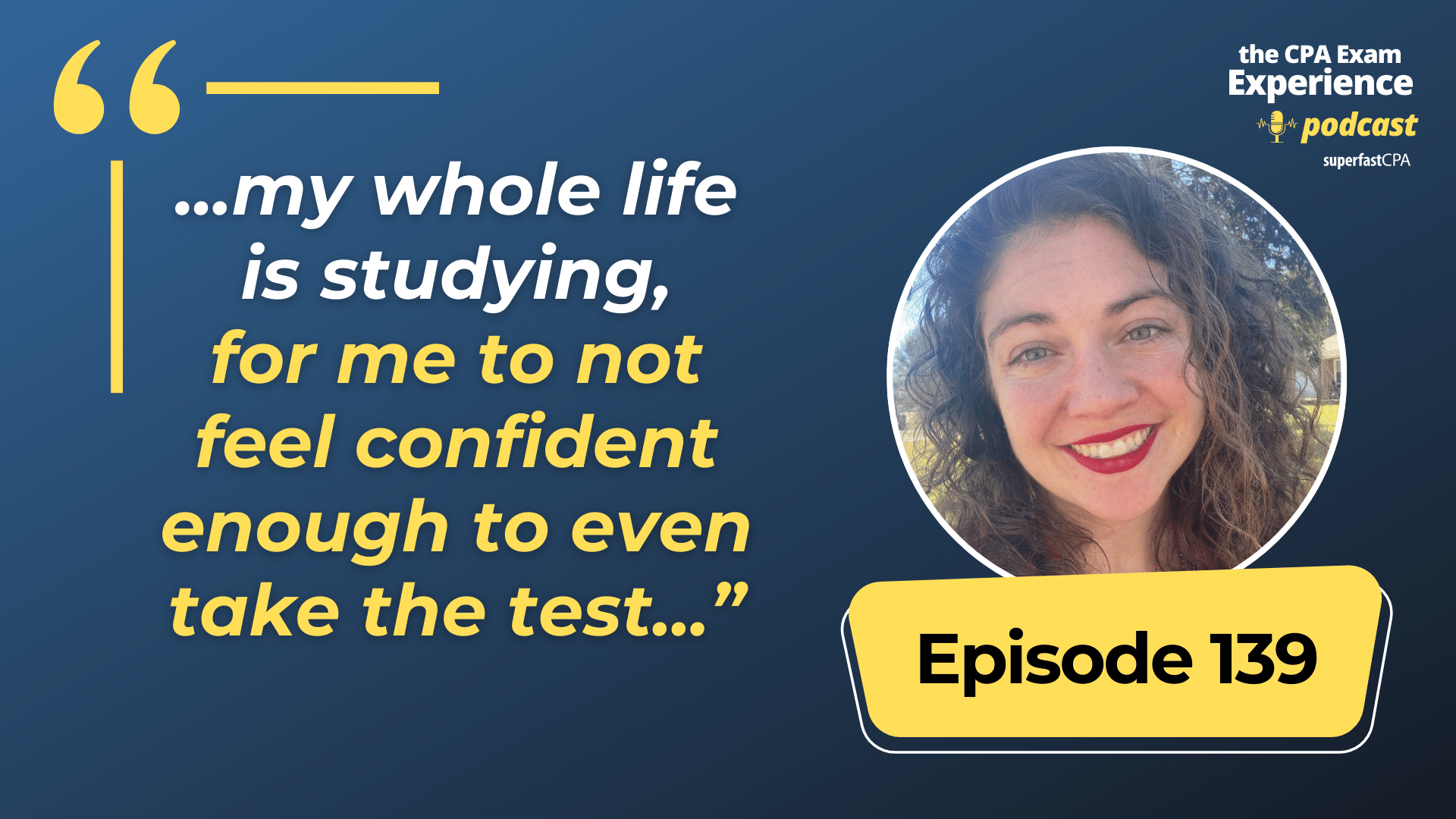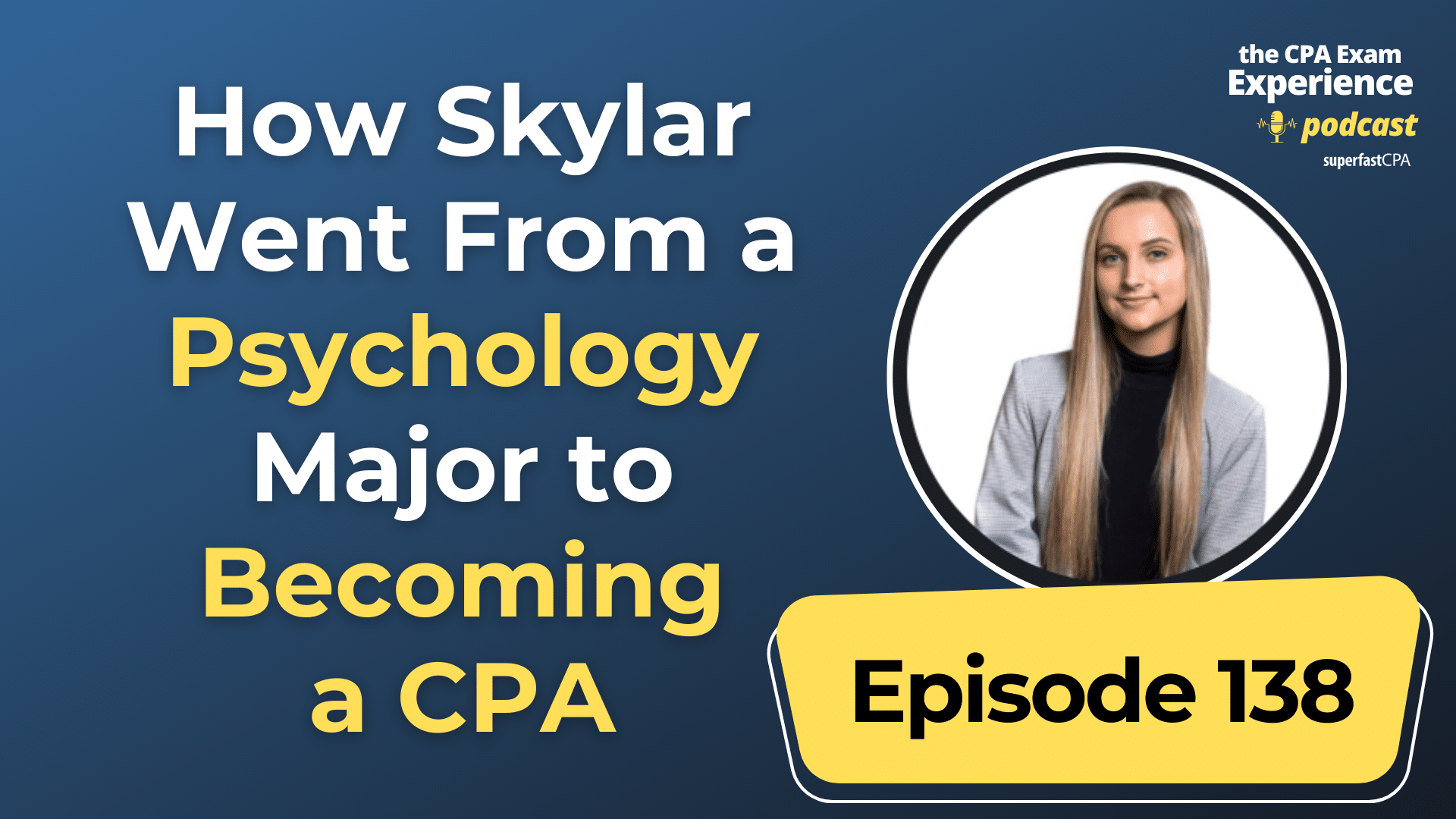Table of Contents
Louisiana CPA Ethics Exam Requirements
While most states require ethics before licensing, Louisiana candidates can become a CPA without it as there are no Louisiana CPA ethics exam requirements. However, part of the Continuing Professional Education (CPE) requirement is to complete a course in professional ethics as required by the board wherein the contents of which must have been pre-approved by the board.
This article will help you to become a CPA in Louisiana and is a requirement for you to take the Louisiana CPA exam.
How to Save Yourself MONTHS of Time and Frustration
Keep in mind that the CPA exam is the one part of getting your CPA license that you can control how long it takes. The education and experience requirements take as long as they take, but the CPA exams can take you as little as 6 months, or as long as multiple years… depending on how effective your study process is from the beginning.
Learn how to study strategically so you can save yourself tons of time and retake fees with this free training…
Summary of Louisiana CPA Requirements
| Credit Hours to sit for CPA Exams | 120 |
| Louisiana State Residency | Yes |
| Good Moral Character | Yes |
| Credit Hours in Business courses other than Accounting | 24 |
| Credit Hours in Upper-level Accounting-related courses | 24 |
| Credit Hours in Commercial Law as it affects Accounting | 3 |
| Bachelor’s Required to sit for CPA Exams? | Yes |
| Credit Hours to receive a CPA License | 150 |
| Ethics Exam Required? | No |
| Work Experience Required | 1 Year |
| Required CPE Hours Every Two Years | 80 |
General Requirements
In order to meet Louisiana CPA Exam requirements, the state requires candidates to meet certain general requirements including:
a.) Must be 18 years of age. A person must have attained the age of 18 years to be granted a certificate of certified public accountant in Louisiana.
b.) Meet the residency requirement. Candidates must have maintained continuous residence (physical presence) in Louisiana for a period of not less than 120 days within the one year period preceding the date of the initial examination. Students are exempted provided they return home when not taking classes, summer, etc.
c.) Be of good moral character, confirmed by personal references. This determination of a candidate’s good moral character is made by evaluation of the applicant’s character references and the candidate’s response to the question concerning the conviction of a misdemeanor or felony.
The reference must be a Louisiana resident who has known the applicant for a period of 12 or more months. A minimum of 3 references is required.
References should be from CPAs or substantial and representative business or professional individuals. They should not be submitted by the following individuals:
- More than one member of a household
- Relative of the applicant
- Roommate
- Students
- University or college instructors unless they have had significant contact with the applicant outside the classroom.
- A person having a financial or business investment with the applicant.
d.) Meet the college educational requirements at the time of filing an application.
Louisiana CPA Exam Requirements: Education
To meet the Louisiana CPA education requirements, candidates must have a baccalaureate or higher degree and earn 24 semester hours in business courses other than accounting, at least 3 semester hours in commercial law, and 24 semester hours in upper-level accounting-related courses.
For CPA Exam
Prior to sitting for the exam, all CPA exam candidates in Louisiana must have a bachelor’s degree or higher (in any major) from a regionally accredited college or university and must have earned specified hours in accounting and business courses.
However, accounting programs at Louisiana universities are generally designed so that graduates with degrees in accounting will have completed the necessary accounting and business concentrations to qualify as a Louisiana candidate, but it is always best to check with an academic advisor.
Applicants must successfully complete 24 hours (or 21 hours graduate level) of specific accounting and 24 hours of business courses including an acceptable three hours of business law exclusively covering Uniform Commercial Code and forms of commercial transactions.
If an applicant is moving to another state to work after college, they should consider the education requirements in that state and/or consult with its board of accountancy before they finish their college education.
Please note that after successful completion of the CPA Exam, applicants must meet all education requirements to become licensed (150 hours) by December 31st of the fifth calendar year following successful completion of the examination, or their exam scores will be voided.
For CPA License
In order to be eligible to apply for a Certified Public Accountant license in Louisiana, applicants must have 150 hours of college education including a baccalaureate or higher degree in a college or university acceptable by the board with concentrations in accounting and business courses. They must as well have successfully passed the CPA Exam and have the qualifying experience.
Applicants must note that if they have not already earned the required 150 semester hours for licensing after successfully passing the CPA exam, they must have earned the required hours to become licensed by December 31st of the fifth calendar year following successful completion of the examination, or their exam scores will be voided.
Recognized Schools, Colleges and Courses
There are six major regional associations and those universities and colleges under these accrediting bodies are accepted by the board, these six regional associations are:
- Southern Association of Colleges and Schools
- Middle States Commission on Higher Education (formerly known as Middle States Association of Colleges and Schools)
- New England Association of Schools and Colleges
- Higher Learning Commission (formerly known as North Central Association of Colleges and Secondary Schools)
- Northwest Commission on Colleges and Universities (formerly known as Northwest Association of Schools and Colleges)
- Western Association of Schools and Colleges
Accounting and Business Courses
Louisiana CPA applicants must meet the required accounting and business courses for the educational requirements. These are the following:
Accounting Courses (24 hours undergraduate or 21 hours graduate level or in combination):
Undergraduate Semester Hours
- Intermediate – 6 hours
- Cost accounting – 3 hours
- Income Tax – 3 hours
- Auditing (related to external reporting) – 3 hours
- 9 hours of Accounting Electives (see below)
- Total Accounting Courses (Undergraduate) – 24 hours
Graduate Semester Hours
- Intermediate – 3 hours
- Cost – 3 hours
- Income Tax – 3 hours
- Auditing (related to external reporting) – 3 hours
- 9 hours of Accounting Electives (see below)
- Total Accounting Courses (Graduate) – 21 hours
Accounting Elective Hours – 3 semester hours from one of the following:
- Advanced Financial Accounting
- Not-for-Profit (or Govt,) Accounting/Auditing
- Accounting Theory
Additional 6 semester hours in accounting above the basic and beyond the elementary/principles or introductory level.
• Business Courses – 24 hours, not inclusive of Accounting courses:
- Including at least 3 semester hours in Commercial Law
- Total Business Courses:
- Undergraduate – 24 hours
- Graduate – 24 hours
- Or a combination of undergrad & grad of 24 hours.
For further information on the course requirements, visit the Louisiana Board of Accountancy’s rules related to the education and CPA examination.
Foreign Applicants
Candidates or applicants who have completed educational requirements at institutions outside the U.S. must have their credentials evaluated by the Foreign Academic Credentials Service (FACS) or NASBA’s International Evaluation Services (NIES).
Either will provide the candidate and the board with an evaluation as to the degree and the credited accounting and business courses. This evaluation must be made well in advance of the time for filing an application to take the CPA examination. There is a fee charged for this service. Refer to FACS or NIES for more information.
Pass the Uniform CPA Examination
The “Uniform CPA Examination”, which is a 4-part exam, is developed by the AICPA – the American Institute of Certified Public Accountants and administered by NASBA – the National Association of State Boards of Accountancy.
The Three Core Exam Sections
Auditing and Attestation (AUD)
The Auditing and Attestation (AUD) section of the Uniform CPA Examination (the Exam) tests the essential knowledge and skills a newly licensed CPA must demonstrate when performing audit engagements, attestation engagements or accounting and review service engagements.
Newly licensed CPAs are required to:
- Demonstrate knowledge and skills related to professional responsibilities, including ethics, independence, and professional skepticism. Professional skepticism reflects an iterative process that includes a questioning mind and a critical assessment of audit evidence.
- Understand the entity including its operations, information systems (including the use of third-party systems), and its underlying business processes, risks, and related internal controls.
- Understand the flow of transactions and underlying data through a business process and its related information systems.
Financial Accounting and Reporting (FAR)
The Financial Accounting and Reporting (FAR) section of the Uniform CPA Examination (the Exam) assesses the knowledge and skills that a newly licensed CPA must demonstrate in the financial accounting and reporting frameworks used by business entities (public and nonpublic), not-for-profit entities and state and local government entities.
The financial accounting and reporting frameworks that are eligible for assessment within the FAR section of the Exam include the standards and regulations issued by the:
- Financial Accounting Standards Board (FASB)
- U.S. Securities and Exchange Commission (U.S. SEC)
- American Institute of Certified Public Accountants (AICPA)
- Governmental Accounting Standards Board (GASB)
Regulation (REG)
The Regulation (REG) section of the Uniform CPA Examination (the Exam) tests the knowledge and skills that a newly licensed CPA must demonstrate with respect to:
- U.S. federal taxation
- U.S. ethics and professional responsibilities related to tax practice
- U.S. business law
The Three Disciplines
The three new disciplines in the 2024 CPA Exam, part of the CPA Evolution initiative, are designed to allow candidates to specialize in areas that align with their career interests and the demands of the modern business environment. Here’s a more detailed look at each discipline:
Business Analysis and Reporting (BAR)
Objective: This discipline focuses on higher-order skills needed in financial statement analysis, business reporting, and the strategic role of the CPA in business decision-making.
Key Topics:
- Financial Statement Analysis: Understanding and interpreting financial statements to assess an entity’s financial health and performance.
- Performance Management: Developing and using key performance indicators (KPIs) to measure, manage, and improve business performance.
- Data Analytics and Visualization: Utilizing data analytics tools to analyze business data, and effectively presenting data to support business decisions.
- Strategic Planning and Risk Management: Involvement in the strategic planning process and identifying, assessing, and managing business risks.
- Business Processes and Controls: Understanding and evaluating business processes and internal controls to improve efficiency and effectiveness.
Information Systems and Controls (ISC)
Objective: This discipline is tailored for those interested in information technology, data security, and controls. It addresses the increasing role of technology in accounting and auditing.
Key Topics:
- IT Governance and Risk: Understanding the frameworks for managing and governing enterprise IT; identifying and managing IT-related risks.
- Information Security and Cybersecurity: Knowledge of cybersecurity principles, data protection laws, and the steps necessary to protect information assets.
- System and Organization Controls (SOC) Reporting: Understanding the requirements for SOC reports and the role of CPAs in assessing controls at a service organization.
- Data Management and Privacy: Managing data effectively and understanding privacy regulations.
- Business Continuity and Disaster Recovery: Planning and strategies to ensure business operations can continue and recover from disruptive events.
Tax Compliance and Planning (TCP)
Objective: This discipline focuses on tax compliance, tax planning, and tax strategy, suitable for those who aim to specialize in taxation.
Key Topics:
- Individual Tax Planning and Compliance: Understanding tax laws affecting individual taxpayers, including income, deductions, credits, and tax planning strategies.
- Business Tax Planning and Compliance: Knowledge of tax considerations for different business entities, including corporations, partnerships, and S-corporations.
- Estate, Gift, and Trust Taxation: Understanding the tax implications and planning strategies for estates, gifts, and trusts.
- International Taxation: Knowledge of taxation issues related to cross-border transactions and multinational enterprises.
- State and Local Taxation (SALT): Understanding the complexities of state and local tax laws and their impact on business and individual tax planning.
Tips for Passing the CPA Exam
The CPA exam covers so many topics that you will need to study specifically for each section, usually for 6-8 weeks per section. Even a master’s degree in accounting doesn’t adequately prepare you to just walk in and pass the 4 CPA exams.
You will need a full review course such as Becker, Wiley CPA, Gleim, Roger, etc, and you will need to dedicate several hours a day over the course of months to even have a chance at getting passing scores.
How to Save Yourself MONTHS of Time and Frustration
Keep in mind that the CPA exam is the one part of getting your CPA license that you can control how long it takes. The education and experience requirements take as long as they take, but the CPA exams can take you as little as 6 months, or as long as multiple years… depending on how effective your study process is from the beginning.
Learn how to study strategically so you can save yourself tons of time and retake fees with this free training…
Louisiana CPA Exam Cost Breakdown
The Louisiana CPA exam cost consists of four main fees: an education evaluation application fee of $160, the $334.20 per CPA exam section totaling $1379.20 for all four sections, the license certificate fee that costs $100 and the renewal fee of $100.
| Education Evaluation Application Fee | $90.00 |
| Auditing and Attestation (AUD) | $344.80 |
| Financial Accounting and Reporting (FAR) | $344.80 |
| Regulation (REG) | $344.80 |
| Disciplines (ISC, TCP, or BAR) | $344.80 |
| Total for all 4 CPA Exam Sections | $1,379.20 |
| CPA Certificate Fee | $100.00 |
| CPA Certificate Renewal Fee | $100.00 |
Louisiana CPA Experience Requirements
To meet the Louisiana CPA experience requirements, one year of experience is required and may consist of full-time or part-time employment that extends over a period of no less than one year and no more than four years. Experience shall be obtained within the immediate four-year period preceding the application. Part-time employment shall consist of no fewer than 2,000 hours of performance of services in or advice using accounting, attest, management advisory, financial advisory, tax, or consulting skills.
Candidates will have to have their experience verified to the board by a certificate holder or one from another state. An acceptable experience shall include employment in government, industry, academia, or public practice.
Louisiana CPA License Requirements
After passing the Uniform CPA exam, successful exam candidates must meet all education requirements (150 semester hours) by December 31st of the fifth calendar year following successful completion of the examination, or the CPA exam scores will be voided.
Once the education, examination, and experience requirements have been met, an application can be downloaded and submitted to the board for approval.
A successful exam candidate may not use the Certified Public Accountant or CPA title until the certificate (license) application has been approved by the board.
Requirements for a Louisiana CPA license include:
- Successful completion of the Uniform CPA examination.
- Be of good moral character.
- Be 18 years of age or more.
- Complete the one-year experience requirement as verified by a licensed CPA.
- Submit the application form required by the board.
- Pay the certificate application fee of $100.
- Execute an oath prescribed by the board.
How to Save Yourself MONTHS of Time and Frustration
Keep in mind that the CPA exam is the one part of getting your CPA license that you can control how long it takes. The education and experience requirements take as long as they take, but the CPA exams can take you as little as 6 months, or as long as multiple years… depending on how effective your study process is from the beginning.
Learn how to study strategically so you can save yourself tons of time and retake fees with this free training…

